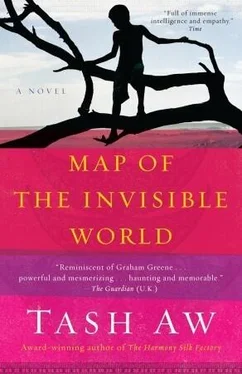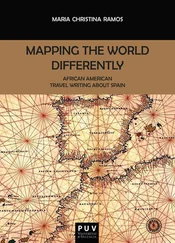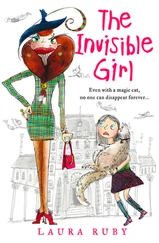Tash Aw - Map of the Invisible World
Здесь есть возможность читать онлайн «Tash Aw - Map of the Invisible World» — ознакомительный отрывок электронной книги совершенно бесплатно, а после прочтения отрывка купить полную версию. В некоторых случаях можно слушать аудио, скачать через торрент в формате fb2 и присутствует краткое содержание. Год выпуска: 2010, Издательство: Spiegel & Grau, Жанр: Современная проза, на английском языке. Описание произведения, (предисловие) а так же отзывы посетителей доступны на портале библиотеки ЛибКат.
- Название:Map of the Invisible World
- Автор:
- Издательство:Spiegel & Grau
- Жанр:
- Год:2010
- ISBN:нет данных
- Рейтинг книги:4 / 5. Голосов: 1
-
Избранное:Добавить в избранное
- Отзывы:
-
Ваша оценка:
- 80
- 1
- 2
- 3
- 4
- 5
Map of the Invisible World: краткое содержание, описание и аннотация
Предлагаем к чтению аннотацию, описание, краткое содержание или предисловие (зависит от того, что написал сам автор книги «Map of the Invisible World»). Если вы не нашли необходимую информацию о книге — напишите в комментариях, мы постараемся отыскать её.
comes an enthralling novel that evokes an exotic yet turbulent place and time—1960s Indonesia during President Sukarno’s drive to purge the country of its colonial past. A page-turning story,
follows the journeys of two brothers and an American woman who are indelibly marked by the past — and swept up in the tides of history.
Map of the Invisible World — читать онлайн ознакомительный отрывок
Ниже представлен текст книги, разбитый по страницам. Система сохранения места последней прочитанной страницы, позволяет с удобством читать онлайн бесплатно книгу «Map of the Invisible World», без необходимости каждый раз заново искать на чём Вы остановились. Поставьте закладку, и сможете в любой момент перейти на страницу, на которой закончили чтение.
Интервал:
Закладка:
“But that was an eternity ago, before …”
“Before what?”
He shrugged again — a tic he had developed, Margaret noticed, a vague lifting of his shoulders that did not seem to mean anything. She was not sure if it signified stress or nervousness or anger or ignorance.
They were nearly out of the yard when they saw the nurse named Cantik running awkwardly toward them, tripping slightly on her flimsy sandals. She was clutching something in her hand — a white ball that turned out to be paper. She thrust it at Margaret through the open window, presenting it as if it were something rare and wonderful. “Sometimes patients leave things behind — when they die, for example, and no one comes and claims them. We put all these items in a box and most of the time we forget about them. Anyway, after you left I said to myself, Hey, why don’t I look in the box, just in case? There was almost nothing in it. To be honest, the people who work in the hospital, they take things. They figure no one’s going to come back for them, so why not? But at the bottom of the box I found this, and I remembered the photo you showed me of your friend’s son. I remembered his name.” She looked pleased with herself, even though she was squinting in the harsh white sunlight.
The cheap, almost translucent paper, so common in Jakarta, had been wadded into a tight ball that Cantik had only partially uncrumpled, and Margaret carefully teased the crushed sheets apart. They clung to each other with the brittleness of the autumn leaves she remembered from her years in America. The first few sheets she extracted were blank, marked only by deep, already yellowing creases. Only one sheet bore any words — elegant handwriting, the letters slanting forward and curling like the crests of waves. The first line read, “To my dear Adam …”
19
D aybreak. The sudden clearing of the skies, the fading of night into memory. The noise. The people. He recoiled from it all and wished he could retreat into slumber, where things were safer and, it seemed, more certain. In this daytime world everything was harsh and confusing and temporary. In this great city nothing remained the same for long. There was a time when he had been different and special, he thought, not so long ago in a place by the sea. But that place was far away and now he was just like everyone else.
“Here, have another one,” Din said, handing him a sweet Chinese bun, its crumbly pastry shell topped with sesame seeds. Adam took it and pushed it into his mouth, cupping his palm under his chin to catch the falling crumbs. As the pain in his ribs faded slightly, a new irritation arose to trouble him: hunger. He could not remember ever having experienced this sensation in his life with Karl. It began as a twinge that seemed to expand into a hollow emptiness; it filled his insides so completely that he could think of nothing else. Din did not need to eat, it seemed to Adam. He scribbled furiously on scraps of paper and cut out articles from newspapers, deep in concentration. After he had returned from the rally, he had left Adam in the house to recuperate and reappeared sometime later with a small parcel of food wrapped in newspaper, which he presented to Adam with great ceremony, as if certain it would cement their new friendship. He also brought a satchel of Adam’s clothes from Margaret’s. Before they left the house that morning he had told Adam to put on some of these clothes — a nice clean shirt and smart trousers, as if they were going on an outing to somewhere special. “Where are we going?” Adam had asked, and Din had said, “Oh, somewhere special.”
Adam searched the satchel for his notebook and photos, hoping that Din would have packed them too; but there was nothing but clothes. His life on Perdo with Karl — what he had always known as his Present Life — was slipping away from him. And it was being replaced by a newer Present that he did not like.
“Why don’t you have the rest? I’m not really hungry. Didn’t we have a lot of food this morning?” Adam knew that he was meant to say, Yes, it was a treat, thank you so much, Din. But he could not bring himself to enthuse about the curious assortment of stale snacks that Din had produced, for it had done little to alleviate the aching emptiness that filled Adam’s belly. He did not want to recall his breakfasts on Perdo: copious quantities of rice and leftovers from dinner, and fruit and coffee. They had seemed restrained and sensible then, as had all his meals, but now he realized that each time he’d sat down at the table with Karl it had been a small feast. Still, Din was trying to do his best; and in any case those Perdo meals seemed to belong to some distant past. He was not going to find Karl — he had to accept that.
They were walking along a dirt road, beyond the limits of Kota, almost beyond the city itself. Tiny shards of grit and sand worked their way into Adam’s shoes. Somewhere in a cluster of shacks by the road a radio was playing a pretty, lighthearted keroncong tune, the soprano voice tinkling in the air like splinters of glass. Adam thought he had heard it somewhere before, on Perdo, a long time ago. Din began whistling the tune as he walked; there was a spring in his step, and he seemed bright and full of energy, speaking without any of the previous day’s vitriol.
“We’re really not far from the coast now. Afterward, once we’ve done what we need to do, maybe we’ll go and look at the ships at Sunda Kelapa. You know, those big colorful boats with the huge sails. Hey, I can smell the sea — can you?”
Adam nodded weakly. He could not, in fact, smell the sea; all he could discern was the faintest tinge of moisture in the arid breeze, but otherwise there was nothing but the sour, ever-present stench of rotting garbage and kerosene.
“Thing is,” Din continued, “we forget that Malaysia is just over there. If we wanted to, we could almost swim there! It’s really part of Indonesia — we could annex it so easily.” He stretched out his arm and pointed at some unknown point in the distance, as if he could reach out and touch that country called Malaysia. “That’s where your brother is,” he said.
The road became gravelly, the tiny pebbles underfoot crunched loudly.
“You said you couldn’t remember much about your brother,” Din continued, his voice softening, becoming almost fatherly, the way it had when he met Adam that first day.
“I try all the time.” Adam felt he could speak freely now; they were so far from Margaret or Karl or anyone else Adam knew that it did not seem to matter what he said. “But nothing comes back. Just the basics — he was older and bigger than me, and I have a vague memory that he was brave. And then he went away. I know that, but I can’t remember it.”
“You were very close, weren’t you?”
Adam nodded. He did not know how he knew this — he just did. “I get so angry with myself when I can’t remember anything. I try and think of him, but nothing comes back. I hate myself. I’m useless.”
“No you’re not,” said Din, putting an arm around Adam’s shoulders. “It’s quite common, even normal. You must have suffered some sort of trauma that your brain has blocked out.” He sounded authoritative and entirely certain, as if expounding a scientific theory.
“But I can’t remember any trauma.”
“That’s the point. The brain is a very complex thing. When a human being suffers great emotional or physical pain, sometimes the only way to deal with it is to forget it altogether. You can’t control this — the brain does it by itself, a kind of selective amnesia. You do know what amnesia is, I presume. Anyway, the brain creates a void in the memory. Other things associated with the pain might remain — noises or smells or visual recollections — but the pain itself is removed. The problem is that a lot of other valuable stuff is sometimes dragged into the void too.”
Читать дальшеИнтервал:
Закладка:
Похожие книги на «Map of the Invisible World»
Представляем Вашему вниманию похожие книги на «Map of the Invisible World» списком для выбора. Мы отобрали схожую по названию и смыслу литературу в надежде предоставить читателям больше вариантов отыскать новые, интересные, ещё непрочитанные произведения.
Обсуждение, отзывы о книге «Map of the Invisible World» и просто собственные мнения читателей. Оставьте ваши комментарии, напишите, что Вы думаете о произведении, его смысле или главных героях. Укажите что конкретно понравилось, а что нет, и почему Вы так считаете.












